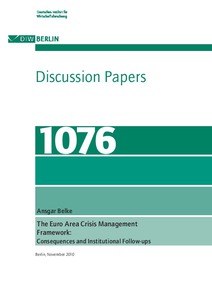The euro area crisis management framework: consequences and institutional follow-ups
"The current instruments in the EU to deal with debt and liquidity crises include among others the European Financial Stability Facility (EFSF) and the European Financial Stabilisation Mechanism (EFSM). Both are temporary in nature (3 years). In terms of an efficient future crisis management fr...
| Main Author: | |
|---|---|
| Institution: | ETUI-European Trade Union Institute |
| Format: | TEXT |
| Language: | English |
| Published: |
Berlin
2010
DIW |
| Subjects: | |
| Online Access: | https://www.labourline.org/KENTIKA-19182838124919000109-The-euro-area-crisis-managemen.htm |
| Summary: | "The current instruments in the EU to deal with debt and liquidity crises include among others the European Financial Stability Facility (EFSF) and the European Financial Stabilisation Mechanism (EFSM). Both are temporary in nature (3 years). In terms of an efficient future crisis management framework one has to ask what follows after the EFSF and the EFSM expire in 3 years time. In this vein, this briefing paper addresses the question of the political and economic medium-to long-term consequences of the recent decisions. Moreover, we assess what needs to be done using this window of opportunity of the coming 3 years. Which institutions need to be formalized, into what format, in order to achieve a coherent whole structure? This briefing paper presents and evaluates alternatives as regards the on-going debate on establishing permanent instruments to support the stability of the euro. Among them are the enhancement of the effectiveness of the Stability and Growth Pact combined with the introduction of a "European semester" and a macroeconomic surveillance and crisis mechanism, fiscal limits hard-coded into each country's legislation in the form of automatic, binding and unchangeable rules and, as the preferred solution, the European Monetary Fund." |
|---|---|
| Physical Description: | 17 p. Digital |

